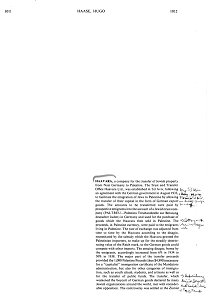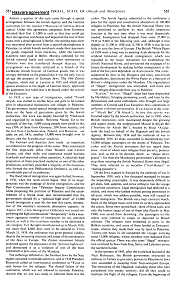from:
-- Haavara; In: Encyclopaedia Judaica 1971, vol. 7
-- Israel, State of; In: Encyclopaedia Judaica 1971, vol.
9
The Haavara agreement - 8,100,000 Palestine Pounds (LP)
(from: Haavara; In: Encyclopaedia Judaica 1971, vol. 7)
<HAAVARA, a company for the transfer of Jewish property
from Nazi Germany to Palestine. The Trust and Transfer
Office Haavara Ltd., was established in Tel Aviv, following
an agreement with the German government in August 1933, to
facilitate the emigration of Jews to Palestine by allowing
the transfer of their capital in the form of German export
goods.
The amounts to be transferred were paid by prospective
emigrants into the account of a Jewish trust company
(PALTREU - Palestina Treuhandstelle zur Beratung deutscher
Juden [Palestine trust office for consulting of German
Jews]) in Germany and used for the purchase of goods
which the Haavara then sold in Palestine.
The proceeds, in Palestine currency, were paid to the
emigrants living in Palestine. The rate of exchange was
adjusted from time to time by the Haavara according to the
disagio, necessitated by the subsidy which the Haavara
granted the Palestinian importers, to make up for the
steadily deteriorating value of the Reich mark, so the
German goods could compete with other imports.
The ensuing disagio, borne by the emigrants, accordingly
increased from 6% in 1934 to 50% in 1938. The major part of
the transfer proceeds provided the 1,000 Palestine Pounds
(then $ 4,990) necessary for a "capitalist" immigration
certificate of the Mandatory administration, but also for
other categories of immigration, such as youth aliyah,
students, and artisans as well as for the transfer of public
funds.
The transfer, which weakened the boycott of German goods
declared by many Jewish organizations around the world, met
with considerable opposition. The controversy was settled at
the Zionist (col. 1012)
Congress in Lucerne (1935) which decided by a vast majority
in favor of the transfer and placed the Haavara under the
supervision of the *Jewish Agency. The Haavara continued to
function until World War II, in spite of vigorous attempts
by the Nazi Party to stop or curtail its activities.
The total transfer amounted to LP 8,100,000 (Palestine
Pounds; then $ 40,419,000) including LP 2,600,000 (then $
13,774,000) provided by the German Reichsbank in
coordination with Haavara. The Haavara transfer was a major
factor in making possible the immigration of approximately
60,000 German Jews to Palestine in the years 1933-1939, and
together with the money invested by the immigrants
themselves, in providing an incentive for the expansion of
agricultural settlement and for general economic
development.> (col. 1013)
In £:
<Through the *Ha'avarah, the transfer of Jewish assets
to Palestine, some £6,000,000 were saved and infused into
the economy of Erez Israel (Ereẓ Israel) [[Land of
Israel]] to its great benefit.>
(from: Zionism; In: Encyclopaedia Judaica 1971, vol. 16
[[Supplement: Hitler wanted to occupy all Middle East
But Hitler projected to occupy the whole Middle East with
Palestine and then the Jews would have been under NS rule
again and would have been foreseen for other deportation and
eventually annihilation by work. Hitlers goal was a common
border line with Japan in India. Hitler would have had taken
over the infrastructure which had been installed by the
Jews...]]
Bibliography
-- E. Marcus, in: Yad Vashem Studies, 2 (1959), 179-204
-- S. Esh, in: Am Yisrael Be-Dorenu (1964), 330-43
-- L. Pinner, in: In zwei Welten (1962), 133-66
[LU.P.]>
Sources
|

Encyclopaedia Judaica: Haavara agreement, vol. 7,
col. 1012
|

Encyclopaedia Judaica: Haavara agreement, vol. 7,
col. 1013
|
========
Details of the Haavara agreement: clearing in Berlin - clearing in Palestine
(from: Israel, State of; In: Encyclopaedia Judaica 1971,
vol. 9)
<Almost a quarter of this sum [[of the immigrants to
Palestine]] came through a special arrangement between the
Jewish Agency and the German authorities for the transfer
(*Haavara) of German-Jewish capital. Under this agreement,
emigrants from Germany obtained their first £1,000 in cash
so that they could get their immigration certificates and
deposited the rest of their assets with a clearinghouse in
Berlin; the sterling equivalent was recovered after arrival
from a second clearinghouse in Palestine, to which Jewish
merchants made their payments for goods imported from
Germany, while the German exporters were paid in Berlin.
Moneys collected for the Jewish national funds and various
other remittances to Palestine were also transferred through
Haavara.
The arrangement was fiercely criticized as a breach of the
worldwide Jewish boycott of German goods, but it was
strongly defended on the ground that it was the only way to
salvage the property of German Jews. The 19th Zionist
Congress, which met at Lucerne in 1935 and which paid
special attention to the plight of German Jewry, approved
the agreement but ruled that it be placed under the control
of the Executive.> (col. 531)
[[Supplement: Hitler wanted to occupy all Middle East
But Hitler projected to occupy the whole Middle East with
Palestine and then the Jews would have been under NS rule
again and would have been foreseen for other deportation and
eventually annihilation by work. Hitlers goal was a common
border line with Japan in India. Hitler would have had taken
over the infrastructure which had been installed by the
Jews...]]
Sources
|

Encyclopaedia Judaica: Israel, State of, vol. 9,
col. 531-532,
with details about the Haavara agreement |
========